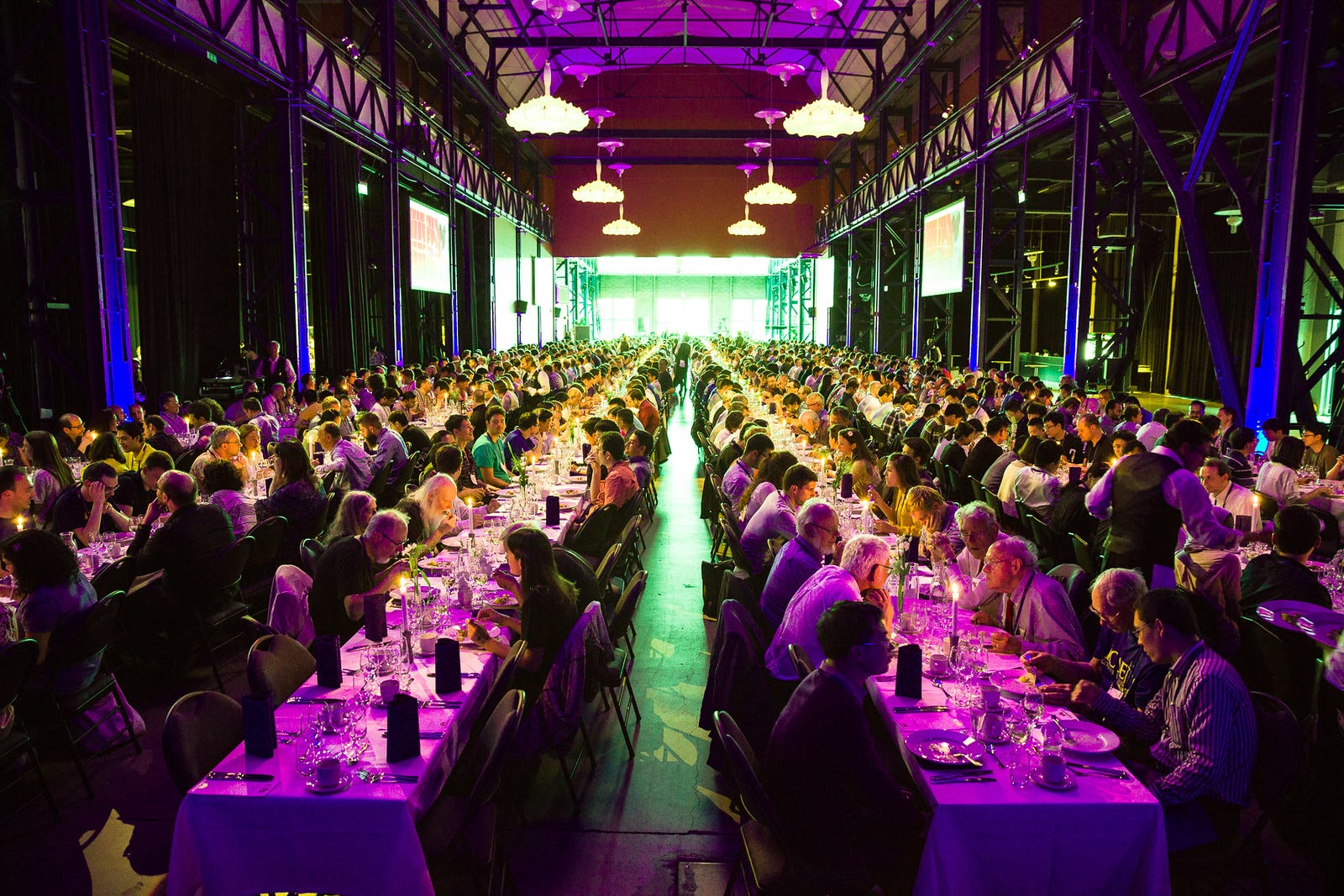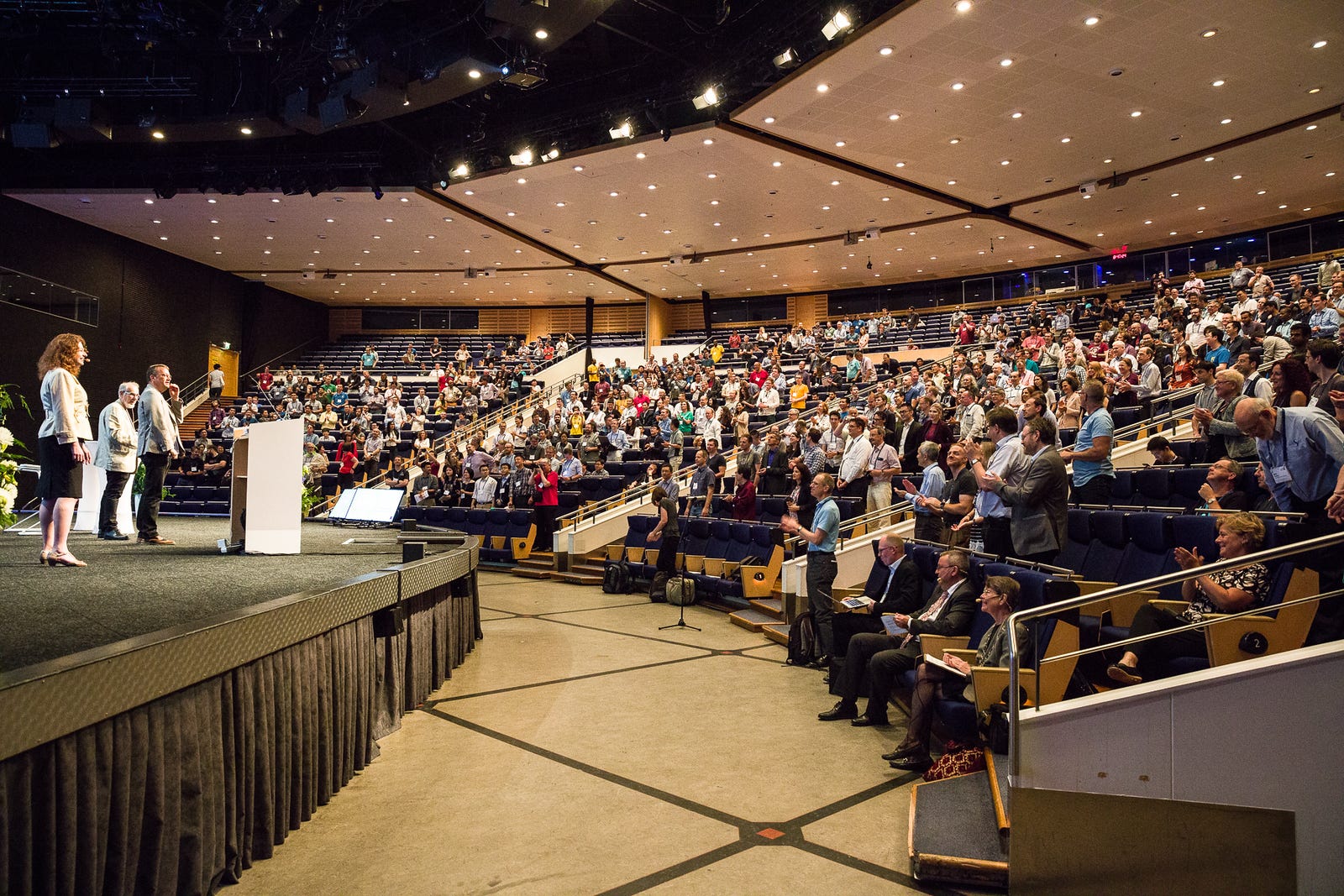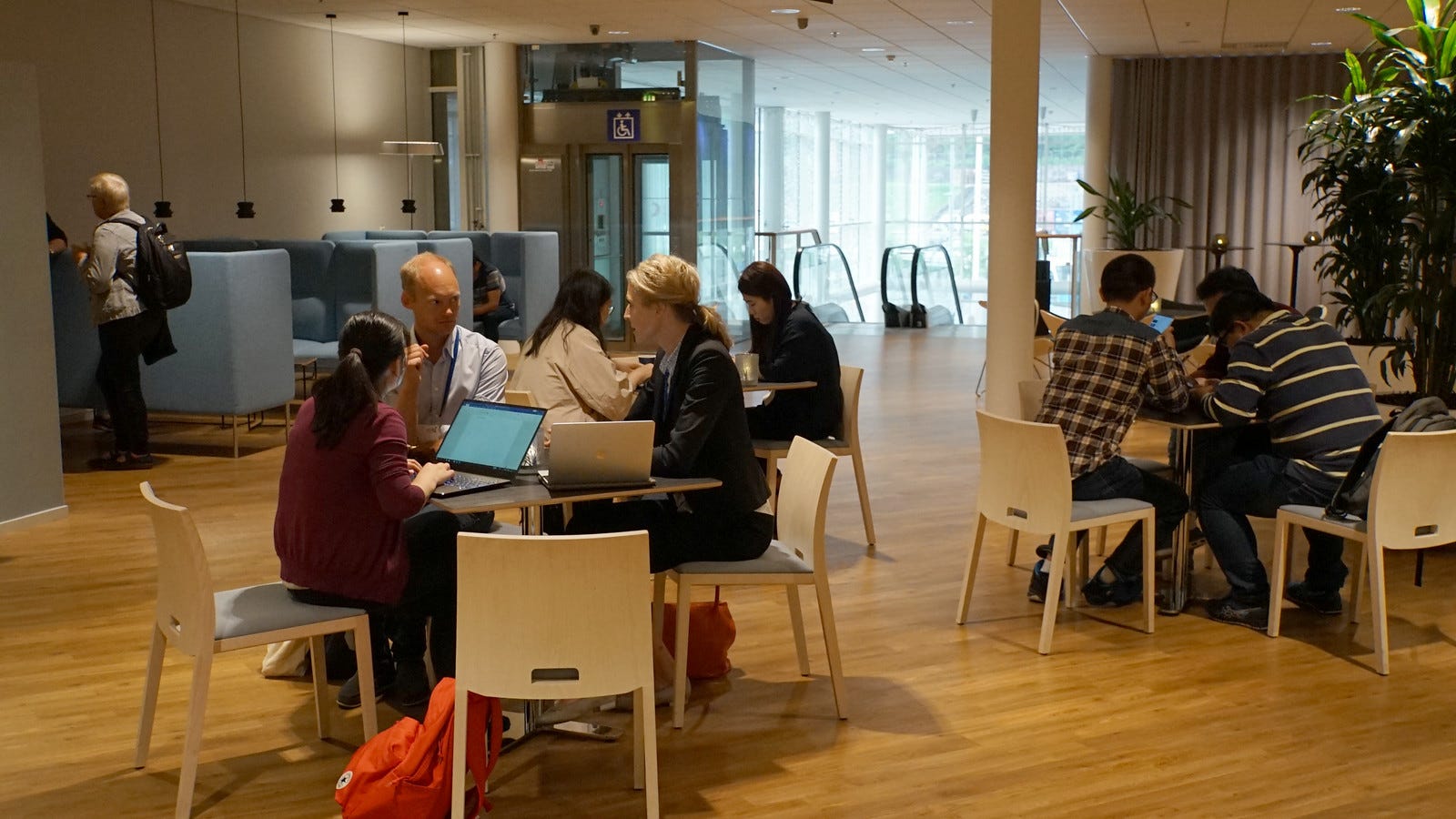原文写在Medium上,由于国内无法访问,只好简单的复制粘贴在下面。有条件的话建议访问原文:https://medium.com/@felicitia2010/how-to-get-the-most-out-of-your-first-research-conference-72d44eca1309
The experiences on attending research conferences can be very different for everyone. Fun as in hanging out with friends and traveling around, productive as in discussing research ideas and collaboration opportunities, boring as in you don’t understand the talks and you don’t know anyone, nervous as in you’re worried about your presentation(s), or exhausting as in you’re too popular that everyone wants to talk to you :)

As for myself, I find conferences super helpful and sometimes could even change your life such as your career path. Especially when you’re at the early stage of your career, there’s just so much you can get out of the conferences depending on what you do and who you talk to.
Now I look back, my first conference could definitely be better if I did certain things differently. So I decided to write this article when my memory is still relatively fresh (I’m not that far from my first conference — ICSE 2016 in Austin and I just got back from another conference — ASE 2018 in Montpellier).
This article contains some general tips that are applicable to different conferences/participants (both junior and senior), but my target audience would be early-stage researchers (e.g., first-year Ph.D. students) who barely know anyone at the conferences and want to get the most out of the experience.
Note: I’m mainly talking about attending international research conferences and my research field is Software Engineering, so certain things might not apply to other conferences.
Chapter 1: Before the Conference
Yes! There are actually a lot of things you can do even before the conference starts. Conferences can be very intense, so do yourself a favor and prepare beforehand.
- Improve Your English and Reduce Your Accent (for non-English native speakers)
Note: In this section, I will use some examples to emphasize the importance of English, but please don’t take it personally. My point is not that we should all speak “perfect” English (I myself am a non-English native speaker and I have accent too), but to speak “OK” English to be able to communicate efficiently with people from all around the world. For example, accent is totally fine, but if people keep asking you to repeat over and over again because of your pronunciation (or even more extreme, you have to write down or spell the word you’re trying to say), then it’s not fine.
This is a long-term effort, but very very important (ah I can’t emphasize enough!). In our field, researchers are from all around the world with all kinds of native languages (I love the diversity BTW!), but you need to speak English at the international conferences. No matter how good you are at research or paper writing, if your oral English is not good enough for communication, you just lose so many opportunities from the beginning. People might lose interests in your talks or are not “patient” enough to talk to you if they can’t understand you easily (e.g., heavy accent). Remember, everyone is busy at conferences and efficiency is very important since the conference is usually only a couple of days annually. So an unproductive conversation won’t last long and you’re not very likely to get to “deep” and useful conversations after small talks.
If you think ( “this is not a big deal” || “I can just read people’s papers instead of talking to them” || “hanging out with people from my home country is enough”)
{
Let me show you some examples to encourage you to think differently…
Example#1 (only speaking native language): Let’s say you only hang out with people from your home country because you’re more comfortable speaking your native language. This simply limits your network (don’t forget we have excellent researchers all around the world!), and builds a “wall” from other people to join your conversation (I’ll talk more about the “wall” in Chapter 2.1). When you want to talk to new people, you may only talk to the ones who look like they speak your native language and you start your conversation in your native language. First of all, you should never make assumptions by people’s look and it can be considered very rude. Or you may use English to ask if other people speak your native language and only continue the conversation if they do. This is even more serious because when your English is not good, you may not ask properly and other people may think you’re racist (no kidding). You might leave a bad impression, not only a bad image about yourself, but possibly your university, even your country. (I’ve actually heard complaints about the whole university when someone from that university did what I just mentioned, since university name sometimes is easier to remember than your name on the badge.)
Example#2 (heavy accent): Accent can be neglected sometimes when you’re already fluent in English, but it’s also something to work on if your accent is too *heavy* that causes communication issues. You can have well-prepared presentations with nice flow, cool slides, fluent speech and so on, but people may still lose their interests if your accent is too heavy to understand. This is actually an “easier fix” because each language has their typical accent and fixing one problem can largely improve the clarity in a lot of scenarios. For example, in Mandarin (my native tongue), “[ɪ]” in “Tim” and “[i]” in “Team” (or a more well-known example of “bitch [ɪ]” and “beach [i]”…) are pronounced the same, or “Ellen [ɛ]” and “Allen [æ]”, etc.
Example#3 (benefits of good conversations): Alright, enough about negative examples... Let’s see what benefits we can gain from good conversations (remember, this only happens when you can communicate efficiently :)). Collaborations (on papers, on proposals, on books, on services like organizing workshops, etc), travel buddies or local recommendations (yup, that’s the ad-on of international conferences!), motivations (meeting your crazy productive peers and having a role model can greatly motivate you for sure! e.g, “Hope to see you next ICSE!” equals to “I’m going back to cram for the deadline!”), advice (on career path, on research, on time management, on relationships, etc), or even job offers, you name it!
}
Now, how to improve then? Remember, our goal is not to speak like an English native speaker, but is to be able to communicate efficiently and clearly. So, don’t be shy to make grammar mistakes (those are not that important in speaking) and focus more on fluency and clarity (the pronunciation of vowels is more important in terms of clarity). There are many ways to improve oral English and reduce accents, such as pronunciation classes (a pronunciation expert is usually more helpful than just an English native speaker because not only they know you’re wrong, but they also know why you’re wrong and how to fix it), conversation groups offered at the universities, learning from TV shows, etc. Find the ones that work best for you and be persistent!
2. Create Networking Opportunities Beforehand
General networking opportunities: If you don’t know that many people and you don’t have specific purposes on networking yet, I think room sharing and services like student volunteer are very good ways to create networking opportunities. (BTW, student volunteer is a good choice for those who don’t have accepted papers but still want to attend the conference. The registration fee (~$500) is waived for student volunteers.) You’re guaranteed to meet new people (e.g., room sharing is not just to meet one new person, but your roommate’s network too!). Research community is relatively small, so you’re very likely to meet the same people over and over again. Why not make friends earlier and you’ll reunite with more friends every year at the conferences! :) P.S. I traveled with my ICSE 2017 and 2018 roommates in Prague after ICSE 2018 and I can’t wait for the reunion next year! ;)
Specific (often professional) networking opportunities: You are usually very familiar with the people who work in your specific area (well, if you are not, try paying attention to remember the names and universities, so not only the paper content, but their authors as well). Also, the conference website usually has a lot of information (e.g., accepted papers are listed before the conference starts), so take advantage of it! Here are some tips on what you can do.
- Check the conference committees (especially the chairs of the sessions will attend the conference for sure) to see if there’s anyone that you want to talk to in particular.
- Check the accepted papers and mark the ones you’re interested in (it’s better if you have time to read those papers before the conference — it can help you understand the talks better and have more in-depth conversations with the authors).
- For those specific people that you really want to talk to, check their websites to see the most up-to-date information (remember, the accepted papers are something they worked on a couple of months ago or even longer since the paper could be rejected before). If you’re ready to have in-depth conversations, you can even set up a meeting with them in advance. And remember their faces (profile pictures) because you can run into them anywhere!
- Check out the co-located events on specific topics (e.g., co-located conferences, workshops, side-tracks). The main conference is usually very big (e.g., ICSE) with thousands of participants, and it’s hard to find someone who has the same specific research interest if you do it blindly. Co-located events usually have specific topics (e.g., MOBILESoft is co-located with ICSE and it gathers SE people who focus on Mobile Software Engineering), so it creates the opportunities to mingle with people in the same area. They sometimes organize social events like banquets as well. Don’t miss out the opportunity to have fancy dinner with people who are also passionate about the same research area just like you!

3. Be Ready for Your Presentation
How to give a good presentation is out of the scope of this article (there are tons of tips!). However, I do want to emphasize the importance of giving a good talk and how much effort you should put in.
First of all, a good talk goes a long way! Not only you will leave good impressions (sometimes even leads to job offers and this is real!), but also more attention to your work, which means more citations, more collaborations, more networking opportunities on spot, and I can go on and on and on…
Another point I want to emphasize is that you should be well-prepared for your presentation before the conference starts. Not only you’ll leave “bad” impression if you’re not well-prepared, but you just miss so many opportunities that I’ve been talking about in this article. Imagine you’re not well-prepared, then you’ll have to stay in your hotel room to prepare or even stay up late (then miss the morning sessions or even meals…). It’s even worse when your talk is on the last day, then you miss out on everything before your talk! What’s the point of flying all the way to the conference and just stay in the hotel room to prepare the presentation? I think you know the answer. :)
People have different styles and schedules before the conference trip, but as a general rule of thumb, start making your slides at least 3 weeks before your trip and do practice talks at least 2–3 times. I know some advisors ask their students to prepare as soon as the paper got accepted, and doing practice talks for >5 times isn’t that uncommon. Remember your talk is an advertisement of your work to attract people to read your paper, not just copy/paste what’s in your paper. As for myself, even if I want to reuse some figures or tables from my paper, I usually redo them completely to fit in the story and style of my presentation. That’s why it can be very time-consuming, so it’s never too early to prepare!

4. Prepare Different “Versions” of Your Research
You should always be prepared to tell people what you are working on, but your audience’s background and where the conversation happens can be very different. So preparing different versions of your research in advance can be very helpful. Here are some example scenarios.
- Prepare for different length, e.g., short version (elevator pitch, waiting in line pitch, etc), medium version (waiting for food at the table, shuttle ride to the banquet, etc). Long version usually doesn’t need preparation since it’s likely to happen only with experts in your area and you know exactly what each other is talking about, so just go with the flow and enjoy. :)
- Prepare for different audience, e.g., engineers (probably don’t use research terms but talk about the problems you’re solving and the benefits they’ll gain), researchers in your general area (probably don’t talk too much technical details but more on the ideas), researchers in your specific field (again, go with the flow!).

Chapter 2: During the Conference
Now, you’ve done enough homework for your first conference. It’s time to dive into the things to keep in mind when you’re at the conference.
- Don’t Stay in a “Bubble” & Don’t Build a “Wall”
I know it’s very exciting to see your old friends and hang out with your labmates in a new environment (usually in a different country), but don’t forget to take the opportunity to meet new friends! You see your labmates every day and you can talk to them whenever you want, so take advantage of the conference and don’t stay in a “bubble” with people you already know. I’m not saying you should never be in a bubble, but you can expand your bubble and have your “bubblemates” (e.g., your advisor, your labmates) introduce you to new people. There are a lot of networking opportunities at the conferences to meet new people as well, e.g., meal time (don’t always sit with your “bubblemates”), shuttle rides, receptions, coffee hours, banquets, etc…
When someone new joins your conversation, try to talk about some “general” topics that everybody can participate in. For example, if you talk about your labmates, there is likely to be a lot of names that the “new” member is not familiar with, and that makes her/him hard to join your conversation. So be considerate with your new friends and explain things when necessary (some people might be too shy to ask). If you’re the “new” member, don’t be shy! (well, it’s hard for some people, but try! In fact, everybody is shy on some level, but this is at a conference that gathers people with the same interests, so people come here to network and learn from each other. Usually, everybody is very friendly at the conferences and is open/willing to talk.) So when you join a new conversation, it’s totally OK to ask if you’re not familiar with the topic other people are talking about (learning opportunity!).
Special case: If you have something specific to discuss with a specific group and you don’t want other people to join, then choose “less crowded” areas, e.g., cafe nearby, hotel lobby, conference room. Otherwise, if you hang out in the social area (e.g., where the coffee and cookies are), people usually assume you’re available to talk to.

Another thing (for non-English native speakers) goes back to the importance of English that I talked about in the beginning. When you’re at the conference, please Speak English! If you speak other languages, then you’re building an invisible “wall” that blocks other people to join your conversation. Just imagine if you see someone you want to talk to, but she/he is talking in a different language that you have no idea, are you still going to join that conversation? The chance is usually much lower if you have no idea what that conversation is about. Of course, like the special case I just talked about, speaking your own language (non-English) is another way if you don’t want to be interrupted by other people.
2. Plan Your Day
Conferences are very intense. There are usually multiple sessions happening in parallel. You have your own presentation(s) to worry about, you want to attend some particular talks, you see people you want to talk to all of sudden, you want to check out some posters, etc etc. So you should plan your day and prioritize the things you want to do in advance.
The conference schedule is usually out way before it starts. So make sure you don’t miss what you don’t want to miss. Sometimes you might start talking to people that you didn’t expect, so it’s good to have your schedule in mind so that you can control the time of the conversation. BTW, it’s totally OK to end a conversation because you want to go to a particular talk or something (people do this all the time and it’s not rude at all).
Some conferences have their conference app with their program schedule, where you can mark what you’re interested in and check what’s happening, etc. Take advantage of technologies!
3. “Advertise” Yourself
When you are new to the conference, you barely know anyone, and people barely know you. So it’s YOUR job to advertise yourself! Since we’re talking about research conferences, what attracts people the most is usually your interesting research topics. Your own talk is definitely a good way to advertise yourself and your work, and to attract people with the same interests (that’s why your presentation is sooo important!). So not only you need to be well-prepared for your talk, but you can also start advertising your talk beforehand to attract more audience. For example, you can tell people when your talk is, post on social media (or have your co-authors post it too), or even record your talk so that people can still see it if they missed it (like me :)). Speaking of advertising, here’s my Youtube channel that has the conference talks I have recorded so far :) https://www.youtube.com/channel/UCn-EdIQUp1jZI1zahbXYLBw.
4. Take Notes & Have in-depth Discussions
We talked about the pros of meeting more new people (“BFS”), but you only have that much time and energy, so make sure to talk to the people you really want to talk to in-depth (“DFS” is usually more useful in a short-term).
To do so, you first need to have a relatively deep understanding of those people’s work before you talk to them. Recall in Chapter 2, we already covered a few tips on preparing in-depth conversations before the conference starts (when I talked about “Specific (often professional) networking opportunities”). Besides those, you can still do some homework on spot. For example, you can take notes (Otherwise you might forget. So many things going on at the conferences!) during the talks or the conversations on the things you want to look up more in-depth (e.g., papers, people’s names etc). Now you’ll probably have specific questions in mind already, then go catch em’! :)
Chapter 3: After the Conference
Whaaat? There’s more to do even after the conference?! Please don’t panic. :) There are only a few things to do so that people can remember you and can contact you easily when they want to.
- Connect with people on social media (and connect with them when they still remember you, e.g., at the conference after talking to them). I’m not advertising for social media or anything, but I’m just speaking from my own experience. I always meet a lot of new peers and I find that the ones I connected on social media turn to be closer (or at least are less forgettable and sometimes you may find that you share same hobbies!). Also I find connecting with senior researchers (I’m speaking in a student’s perspective) can keep you informed about their work or services, e.g., they post updates about the academic conferences/workshops/events they’re involved in (they’re usually serving as the committee), about their work (e.g., paper accepted), about the invited talks they give, etc.
- Send a follow-up email to the new people you want to keep in touch, especially when it’s hard to find you on the Internet. I know as a new Ph.D. student, you don’t want to put up your website or have your Google Scholar account when you don’t have any papers yet (but they’ll come! :)). Then basically people can’t find you even if they want to. In this case, make sure to send a follow-up email so that at least they have your contact information.

FINALLY, WE ARE DONE!!!
I know this is a lot… The purpose of this article is to list “everything” I can think of that I wish I knew earlier when I attended my first research conference. However, you may have different expectations and purposes at the conference, so certain things may not be applicable. But I hope you can at least get something out of this article!
Happy publishing and enjoy your conferences! :)






















 被折叠的 条评论
为什么被折叠?
被折叠的 条评论
为什么被折叠?








